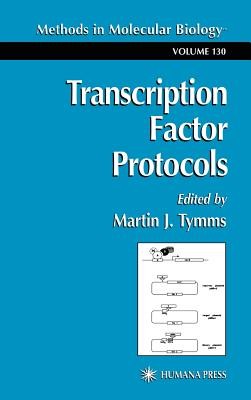
- We will send in 10–14 business days.
- Publisher: Humana
- ISBN-10: 0896035735
- ISBN-13: 9780896035737
- Format: 15.2 x 22.9 x 2.2 cm, hardcover
- Language: English
- SAVE -10% with code: EXTRA
Transcription Factor Protocols (e-book) (used book) | bookbook.eu
Reviews
Description
The effort to sequence the human genome is now moving toward a c- clusion. As all of the protein coding sequences are described, an increasing emphasis will be placed on understanding gene function and regulation. One important aspect of this analysis is the study of how transcription factors re- late transcriptional initiation by RNA polymerase II, which is responsible for transcribing nuclear genes encoding messenger RNAs. The initiation of Class II transcription is dependent upon transcription factors binding to DNA e- ments that include the core or basal promoter elements, proximal promoter elements, and distal enhancer elements. General initiation factors are involved in positioning RNA polymerase II on the core promoter, but the complex - teraction of these proteins and transcriptional activators binding to DNA e- ments outside the core promoter regulate the rate of transcriptional initiation. This initiation process appears to be a crucial step in the modulation of mRNA levels in response to developmental and environmental signals. Transcription Factor Protocols provides step-by-step procedures for key techniques that have been developed to study DNA sequences and the protein factors that regulate the transcription of protein encoding genes. This volume is aimed at providing researchers in the field with the well-detailed protocols that have been the hallmark of previous volumes of the Methods in Molecular (TM) Biology series.
EXTRA 10 % discount with code: EXTRA
The promotion ends in 19d.14:35:41
The discount code is valid when purchasing from 10 €. Discounts do not stack.
- Publisher: Humana
- ISBN-10: 0896035735
- ISBN-13: 9780896035737
- Format: 15.2 x 22.9 x 2.2 cm, hardcover
- Language: English English
The effort to sequence the human genome is now moving toward a c- clusion. As all of the protein coding sequences are described, an increasing emphasis will be placed on understanding gene function and regulation. One important aspect of this analysis is the study of how transcription factors re- late transcriptional initiation by RNA polymerase II, which is responsible for transcribing nuclear genes encoding messenger RNAs. The initiation of Class II transcription is dependent upon transcription factors binding to DNA e- ments that include the core or basal promoter elements, proximal promoter elements, and distal enhancer elements. General initiation factors are involved in positioning RNA polymerase II on the core promoter, but the complex - teraction of these proteins and transcriptional activators binding to DNA e- ments outside the core promoter regulate the rate of transcriptional initiation. This initiation process appears to be a crucial step in the modulation of mRNA levels in response to developmental and environmental signals. Transcription Factor Protocols provides step-by-step procedures for key techniques that have been developed to study DNA sequences and the protein factors that regulate the transcription of protein encoding genes. This volume is aimed at providing researchers in the field with the well-detailed protocols that have been the hallmark of previous volumes of the Methods in Molecular (TM) Biology series.


Reviews